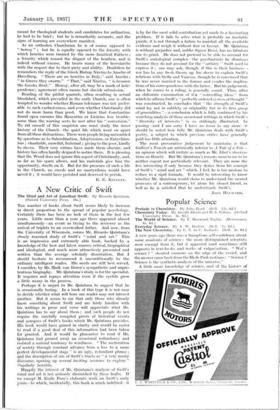A New . Critic of Swift THE number of books about
Swift seems likely to increase in direct proportion to the spread of popular psychology. Certainly there has been no lack of them in the last few years. Little more than a year ago three appeared almost simultaneously—an event • as trying to the reviewer as the arrival of triplets to an overworked father. And now, from the University of Wisconsin, comes Mr. Ricardo Quintana's closely. reasoned. study of Swift's " mind and art." This is an impressive and extremely able book, backed by a knowledge of the best and latest sources, critical, biographical and ideological, and much more attractively presented and written than the average scholarly dissertation. But I should hesitate to recommend it unconditionally to the ordinary intelligent reader. His -needs are still best served, I consider, by Mr. Mark van Doren's sympathetic and unpre- tentions biography. Mr. Quintana's study is for the specialist. It requires and repays attention even if the eyelids grow a little weary in the process.
Perhaps it is unjust to Mr. Quintana to suggest that he is occasionally boring. In a book of this type it is not easy to decide whether what will bore one reader may not interest :another. But it seems to me that only those who already know something about Swift and are fairly familiar with. his writings in prose and verse will appreciate what Mr. Quintana has to say about them ;- and such people do not require the carefully compiled précis of historical events. and synopses of Swift's books which Mr. Quintana provides. H1 book would have gained in clarity and would be easier to read if a goOd deal .of this information had been taken w ior-irinted: And it would be pleasanter to read if Mr. Quintana had pruned away an occasional redundancy. and, resisted a natural tendency' to wordiness. " The melioration of society through constant advance from a less to a more perfect deVelOpmental stage " is an, ugly, redundant phrase ; and thedeSCrintiOn of one of Swift's tracts as " a very meaty ci‘3otrise, "oPening up several inviting avenues to explore " 't■rigUlarly. horrible. Happrly'theAnferest of Mr. Quintana's analysis of Swift's mind and art is not seriously dinaniShed by the 'faults. If we except 'M. Emile ,Pons's elaborate ..work on Swift's early Years—to Nibielijneidentally, thii book is'unicii indebted—it
is by far the most solid contribution yet made to a fascinating problem. If it fails to solve what is probably an insoluble puzzle, it is not through a failure to Marshal all the available evidence and weigh it without fear or favour. Mr. Quintana is without prejudice and, unlike Signor Rossi, has no fabulous axe to grind. He does not pretend to be able to account for Swift's 'scatological complex—the psychiatrists lie dismisses because they do not account for the " artistry " Swift used to express it ; one may ask, though, if this is their business-- nor has he any fresh theory up his sleeve to explain Swift's relations with Stella and Vanessa, though he is convinced that he was never married to the former and evades the implica- tions of his correspondence with the latter. But his judgement, when he comes to a ruling, is generally sound. Thus, after an elaborate examination of the " controlling ideas " from which he affirms Swift's " perfectly ordered system of thought" was constructed, he concludes that " the strength of Swift's mind lay not in subtlety or originality but in its firm grasp of generalities "—a conclusion which is fully confirmed by his searching analysis of those occasional writings in which Swift's " diversity of interests " is so strikingly illustrated. In passing—and I am sorry I have no room to say more—it should be noted how fully Mr. Quintana deals with Swift's poetry, a subject to which previous critics have generally paid too little attention.
The most provocative judgement he maintains is that- Gulliver's Travels are artistically inferior to .4 Tale of a Tub— an opinion which will irritate us much as Mr. Eliot's observa- tions on Hamlet. But Mr. Quintana's reasons seem to me to be neither cogent nor particularly relevant. They are none the less interesting if only because they derive from his concept- of Swift's " mind and art " which, I feel, he is too anxious to reduce to a rigid formula. It would be interesting to know whether Mr. Quintana would claim to understand the mental processes of a contemporary, let alone his closest friend, as
well as he is satisfied that he understands Swift's. •
JOHN HAYWARD.










































 Previous page
Previous page